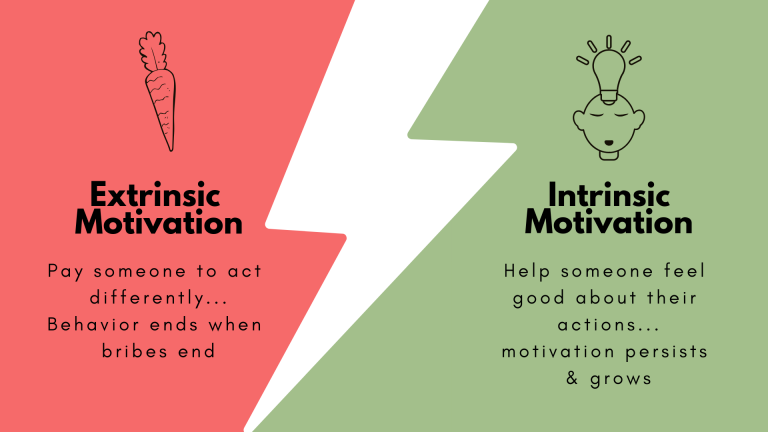
The IPCC’s sharp warnings about climate change are prompting an increased sense of urgency. Every sustainability and climate change advocate wants to motivate change faster. We want to engage everyone and to inspire them all to take meaningful actions that reduce emissions.
So let’s do it already.
After all, we’ve just got to motivate people (including corporate leaders and policy makers) to take action. Surely we know how to do that, right?
Extrinsic vs. Intrinsic Motivation
You might know that motivation comes in two flavors: extrinsic motivation and intrinsic motivation. And it’s just like it sounds—extrinsic motivations are external: I’ll pay you to do this, I’ll fire you if you don’t do that. Intrinsic motivations are internal: it feels good when I do this, I’m proud of myself when I do that.
Motivation around climate change and sustainability is a large hurdle. We need to motivate people to adopt new ways of being and new ways of thinking about resources. We not only need to inspire change: we need that change to persist through the integration of sustainable practices into the DNA of businesses and communities.
Whenever we talk about motivation to an audience, someone will bring up incentives. Incentives go like this: if we want more people to bike to work, for example, we should pay them to bike. And certainly companies have tried this. Research tells us, though, that you can inspire a higher rate of participation if you appeal to a person’s sense of obligation rather than offering a bribe for action. Additionally, in situations where people do the “right” thing for monetary incentives, the behavior becomes tied to the incentive. When the bribes stop, the behavior stops.
By contrast, if we can tap into a person’s intrinsic motivation—if we can help them feel good about their company’s actions to reduce emissions, for example—that motivation is much more likely to persist and even grow over time. A corporate leader might start out aiming to reduce waste and then, as they see and feel the positive results, they might next tackle energy usage.

Recognize and reward good actions
Recognition—rather than bribes—is a great way to facilitate intrinsic motivation. When we recognize a colleague’s or friend’s sustainable efforts, we help them feel good about their actions. We reinforce their activities and feed that intrinsic motivation. This encouragement makes it likely they will continue their efforts and perhaps even adopt additional sustainable practices. Showcasing the good deeds of others (and the corresponding positive impacts on our communities) helps everyone feel a little more optimistic about the significant challenges ahead of us.
To reduce greenhouse gas emissions to the levels necessary to sustain humanity, we need everyone motivated to do their part. We need to facilitate communities where everyone shares a commitment to more sustainable practices. If ever there’s been a time to focus on generating widespread intrinsic motivation around sustainability, this is it. So let’s get it done!
You can learn more about motivation in our recent webinar. Reach out to us if you’d like to learn more about how we can help you reshape your efforts to inspire people to action.
Comments are closed.




